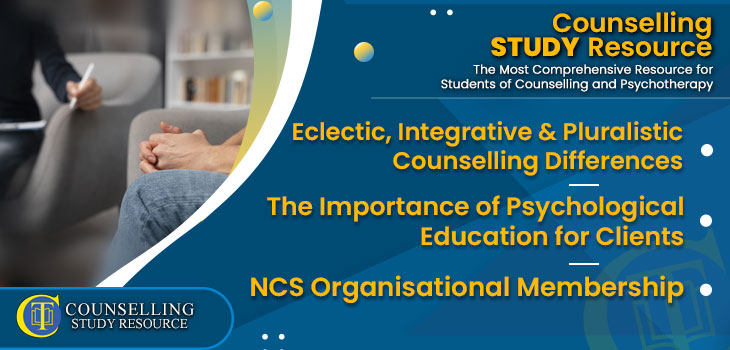262: Eclectic, Integrative and Pluralistic Counselling Difference
The Importance of Psychological Education for Clients – NCS Organisational Membership
In Episode 262 of the Counselling Tutor Podcast, your hosts Rory Lees-Oakes and Ken Kelly take us through this week’s three topics:
- Up first in ‘Theory in Practice’ Rory and Ken take us through the differences between eclectic, integrative and pluralistic counselling.
- Then in ‘Practice Today’, we look at the importance of psychological education for our clients.
- And lastly in ‘Practice Matters’, Rory speaks with Faye Blackwell, Head of Engagement and Development at the NCS (soon to be NCPS) about organisational membership and development.
Eclectic, Integrative and Pluralistic Counselling Differences [starts at 02:20 mins]
This segment of the Counselling Tutor Podcast is sponsored by
WebHealer.net
- WebHealer are the go-to provider of websites for private practitioners in the UK.
- Established over 20 years, WebHealer offers a non-technical and fully supported service to help therapists grow their private practice.
- Just one customer from your website each year pays for their service.
Go to WebHealer.net and use coupon CT100 for £100 off their "Do it for me" service.
When it comes to your practice, you want to be using your knowledge and your CPD to help your client. How you go about putting these into practice determines whether you’re using eclectic, integrative, or pluralistic therapy.
The key points of the discussion on the differences between eclectic, integrative and pluralistic counselling include:
- Integrative counselling – when you seamlessly integrate 2 or more modalities into your practice. These should be blended so that you can't see where one modality ends and another begins. In order to use this method, you should have a very good grounding/understanding of the theories that you're blending together.
- This means that during your practice, it doesn’t feel like lots of different things, and the client won't be given the impression that nothing is working and that multiple different things have to be tried.
- It should just feel like a part of the process – like a well-choreographed dance.
- Eclectic counselling – this is when the theories are kept separate as opposed to blending them together. However, this can sometimes risk feeling disjointed.
- Pluralistic counselling – looking at the client’s preferences and deciding what is the best fit for them. Is there a particular method that they feel works better for them?
- Not all modalities will fit together.
- What is the client presenting with? What modality will best fit with that?
- Most counsellors are integrative on some level – it can come from using information learnt during CPD.
- After all this discussion on the differences between eclectic, integrative and pluralistic counselling, have a think. What are you blending in your practice? Is it seamless? Discuss it in supervision and/or with your peers.
Theory to Practice is sponsored by
Counselling Skills Academy
Learn counselling techniques by seeing counselling skills used in real sessions by qualified therapists.
Real sessions – real-life presentations – real skills.
The Importance of Psychological Education for Clients [starts at 17:01 mins]
Helping the client to understand the reason behind their actions can lift an enormous weight for them.
The main points of this discussion include:
- It can be important to help the client to understand their own processes.
- Negative Automatic Thoughts – not everyone realises that these are normal, everyone has nonsense thoughts and they shouldn’t have to be a source of guilt.
- Sometimes the brain takes executive control (e.g. fight, flight or freeze response) – if the client knows they have no control over this reaction, it can be a great relief to them.
- Having this psychological knowledge can free a person.
- In order to have this knowledge and share it with a client, you’ll need to do some CPD, learning more about the biological condition and why these things happen.
- If the client dwells on their actions in these scenarios, it can create trauma.
- Trauma doesn’t have to be one big event.
Get on-demand Certified CPD that is implementable in your practice
Counsellor CPD Library
- Over 150 hours of on-demand CPD lectures to help you stay current with your CPD ethical requirements
- Support, and be supported, by thousands of other counsellors as a member of the exclusive online community.
- Access your learning anytime you want ... anywhere you choose ... using any device type — desktop or mobile.

NCS Organisational Membership [starts at 28:32 mins]
In this week’s ‘Practice Matters’, Rory continues our NCS series by speaking with Faye Blackwell, Head of Engagement and Development, about organisational membership and development.
Some key elements of Faye’s work at the NCS includes:
- Listening to members’ ideas and concerns, and adapting these into the organisation’s ethos and values.
- Being adaptable and flexible.
- Creating CPD opportunities for certain – and possibly overlooked – communities.
- Listening to real experiences and feedback.
- Offering counselling or creating spaces that offer support for groups that as of yet don’t have this kind of support.
- A department that focuses not only on organisations that provide counselling, but organisations that still align with the NCS’s values, offering support to the community in alternative ways.
- Listening to various ideas and suggestions and working on making them into reality.
- Flexibility in creative thinking – thinking about what can we do to support you?
- Facilitating means of support – especially where it hasn’t yet been seen.
The National Counselling and Psychotherapy Society is proud to sponsor Practice Matters.
NCPS (formerly NCS) are really excited to have launched their Children and Young People Therapist Register for counsellors working with the younger age group.
Free Handout Download
Differences between Eclectic, Integrative and Pluralistic Therapy
